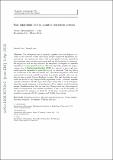Fast algorithms for the quantile regression process
Author(s)
Chernozhukov, Victor; Fernández-Val, Iván; Melly, Blaise
DownloadSubmitted version (370.1Kb)
Open Access Policy
Open Access Policy
Creative Commons Attribution-Noncommercial-Share Alike
Terms of use
Metadata
Show full item recordAbstract
© 2020, Springer-Verlag GmbH Germany, part of Springer Nature. The widespread use of quantile regression methods depends crucially on the existence of fast algorithms. Despite numerous algorithmic improvements, the computation time is still non-negligible because researchers often estimate many quantile regressions and use the bootstrap for inference. We suggest two new fast algorithms for the estimation of a sequence of quantile regressions at many quantile indexes. The first algorithm applies the preprocessing idea of Portnoy and Koenker (Stat Sci 12(4):279–300, 1997) but exploits a previously estimated quantile regression to guess the sign of the residuals. This step allows for a reduction in the effective sample size. The second algorithm starts from a previously estimated quantile regression at a similar quantile index and updates it using a single Newton–Raphson iteration. The first algorithm is exact, while the second is only asymptotically equivalent to the traditional quantile regression estimator. We also apply the preprocessing idea to the bootstrap by using the sample estimates to guess the sign of the residuals in the bootstrap sample. Simulations show that our new algorithms provide very large improvements in computation time without significant (if any) cost in the quality of the estimates. For instance, we divide by 100 the time required to estimate 99 quantile regressions with 20 regressors and 50,000 observations.
Date issued
2020Department
Massachusetts Institute of Technology. Department of EconomicsJournal
Empirical Economics
Publisher
Springer Science and Business Media LLC